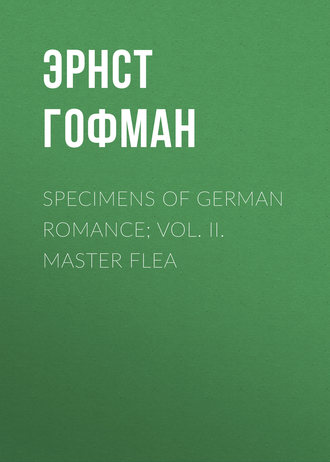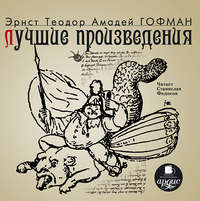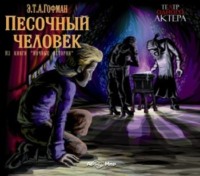 полная версия
полная версияSpecimens of German Romance; Vol. II. Master Flea
"My dearest sir," said the Flea-tamer, putting on a very important face,–"my dearest Mr. Tyss, don't ask me to speak of this event. You know that the horoscope does indeed plainly and perfectly instruct us as to the existence of certain circumstances; but,–such is the wisdom of Eternal Might,–the event of threatening dangers always remains dark and doubtful. I esteem you too highly as an excellent kind-hearted man to put you into disquiet and anxiety before the time; otherwise I should at least tell you so much, that the event which is to give you the consciousness of power, would in the same moment destroy your present form of being with the most horrible agonies of hell. But no! on that too I will be silent; and now not another word of the horoscope. Do not, however, fret yourself, although the affair looks bad enough, and I, with all my knowledge, can hardly see any chance of a favourable issue to the adventure. Perhaps you may be saved from this peril by some unexpected constellation, which is now beyond the reach of observation."
Peregrine was astonished at this deceit, yet still the whole state of the thing, the peculiar situation in which Leuwenhock stood without suspecting it, appeared to him so exceedingly pleasant, that he could not help breaking out into a loud fit of laughter. The microscopist, somewhat surprised at this, asked, "What are you laughing at so vehemently, my dear Mr. Tyss?"
"You do wisely," replied Peregrine, still laughing,–"you do very wisely in keeping secret, out of pure kindness, this threatening event; for besides that you are too much my friend to put me into fear and terror, you have yet another excellent reason for your silence, which is nothing else than that you do not know a syllable about the matter. In vain was all your labour to unriddle that knot; your whole astrology goes but to little; and, if Master Flea had not fallen upon your nose, all your arts would have helped you little."
Leuwenhock's brow was red with rage; he clenched his fist, gnashed his teeth, and trembled so violently with agitation, that he would have tumbled from his seat, if Peregrine had not held him as firmly by the arm as George Pepusch grasped the unlucky taverner by the throat, who at length succeeded in saving himself by a dexterous side-spring. Hereupon George rushed out and entered Leuwenhock's room just as Peregrine was holding him fast upon his seat, while he muttered furiously between his teeth, "Cursed Swammerdamm! is it you that have done this?"
No sooner did Peregrine perceive his friend than he let go of the microscopist, and, going up to him, asked anxiously if that strange frenzy were over which had so dangerously possessed him. Pepusch seemed softened almost to tears, and protested that he had not in all his life committed so many follies as in the course of that one day. Amongst these not the least was, that after he had sent a ball through his head in the forest, he had gone into a tavern,–where he did not know,–had talked to people of strange things, and murderously set upon the host, because, from his broken speech, he gathered that which was the very happiest thing that could befall him. All his paroxysms would now soon have reached the highest pitch, for the bystanders had taken his words for insanity, and he had to fear, instead of reaping the fruit of the happiest event, that he would be confined in a madhouse. With this he explained what the host had let drop concerning Peregrine's conduct and declarations, and asked, with downcast eyes, whether such an act of self-denial, in favour of an unhappy friend, was probable, or even possible, in the present day, when heroism had vanished from the earth.
At these declarations from his companion, Peregrine revived in his inmost heart. He protested with warmth, that for his part he was far removed from doing any thing that might in the least annoy his tried friend; that he solemnly renounced all pretensions to the heart and hand of the fair Dörtje Elverdink, and willingly gave up a paradise, though it had, indeed, opened upon him most seductively.
"And it was you," said Pepusch, rushing into his friend's arms,–"it was you that I would have murdered, and, because I did not believe you, I therefore shot myself. Oh, the madness of a mind ill at ease!"
"I pray you," said Peregrine, "I pray you come to your senses. You speak of having shot yourself, and yet stand fresh and sound before me. How do these things agree?"
"You are right," replied Pepusch, "it seems as if I could not speak to you so rationally as I really do, if I had actually sent a ball through my brain. The people, too, maintain that my pistols were not particularly dangerous, nor, indeed, of iron, but of wood–in fact mere toys–and so neither the duel nor the suicide could have been any thing more than a pleasant mockery. We must have changed our parts; and I have begun to mystify myself and play the child at the moment you have left the world of dream to enter into real life. But be this as it may, it is requisite that I should be certain of your generosity and my fortune, and then the clouds will dissipate which trouble my sight, or perhaps deceive me with the illusions of the Fata Morgana. Come, my Peregrine, accompany me to the fair Dörtje Elverdink."
Pepusch took his friend's arm, and was hastening off with him; but their intended walk was spared, for the door opened, and in tripped Dörtje Elverdink, lovely as an angel, and behind her the old Swammer. Leuwenhock, who had so long remained dumb, casting angry looks first at Pepusch and then at Peregrine, seemed, upon seeing the old Swammerdamm, as if struck by an electric shock. He stretched his clenched hands towards him, and cried out in a voice hoarse with rage–"Ha! do you come to mock me, you old deceitful monster? But you shall not succeed. Defend yourself: your last hour has struck."
Swammerdamm started a few steps back, and as Leuwenhock was ready to fall upon him with his telescope, drew the like arms for his defence. The duel, which had begun at Peregrine's, seemed about to be renewed. George Pepusch threw himself between the combatants, and while with his left hand he beat down a murderous glance of Leuwenhock's, which would have stretched his adversary to the earth, with the left he turned aside the weapon of Swammerdamm, so that he could not injure Leuwenhock. He then declared that he would not allow of any battle between them, till he thoroughly knew the cause of their dissension. Peregrine found this protest so reasonable, that he did not hesitate to throw himself between the champions with a similar declaration. To this the combatants were forced to yield. Swammerdamm, moreover, asserted, that he had not at all come with hostile intentions, but merely to enter into some composition with Leuwenhock, and thus to end a feud which had so long divided two similarly-created principles, whose united researches only could exhaust the deepest springs of knowledge. With this he looked smilingly at Peregrine, into whose arms Dörtje had fled, and expressed a wish that he would mediate.
Leuwenhock, on the other hand, admitted that Dörtje was, indeed, the apple of contention, but that he had just now discovered a new trick of his unworthy colleague. It was not only that, to revive his unjust pretensions to Dörtje, he denied the possession of a certain microscope which he had received on a certain occasion as a quittance; but the more to torment him,–Leuwenhock,–he had given it to another. In answer to all this, Swammerdamm swore, high and low, that he had never received the microscope, and had great reason to believe that Leuwenhock had shamefully purloined it.
"The fools!"–softly whispered Master Flea to Peregrine–"the fools! they are talking of the microscope which is in your eye. You know that I was present at the treaty of peace concluded between them about the possession of the princess, and, when Swammerdamm was flinging into the pupil of his left eye the microscopic glass which he had, in fact, received from Leuwenhock, I snapped it up, because it was not Leuwenhock's, but my lawful property. Tell them plainly at once, that you have the jewel."
Upon this Peregrine made no hesitation in declaring that he was in possession of the microscopic glass which Swammerdamm should have received, but did not receive, from Leuwenhock; and moreover that the union was not yet settled, and neither Leuwenhock nor Swammerdamm had at present the unconditional right to look on Dörtje Elverdink as his foster-daughter.
After much argument, it was agreed by the disputants that Mr. Tyss should marry Dörtje Elverdink, who tenderly loved him; and then, after seven months, should decide which of the two microscopists was the most desirable father-in-law.
However beautiful Dörtje appeared in a dress so admirable that it might seem to have been fashioned by the Loves, and whatever burning looks of passion she might cast at Peregrine, yet he still thought of his protegé as well as of his friend, and remained true to his plighted word, declaring again that he renounced Dörtje's hand. The microscopists were not a little astonished, when Peregrine announced George Pepusch for the man who had the justest claims to the princess, and that he, at all events, had no right to interfere with her choice.
With tears in her eyes the maiden staggered towards Peregrine, who caught her in his arms as she was sinking senseless to the earth. "Ingrate!"–she sighed–"you break my heart in thrusting me from you.–But you will have it.–Take, then, my parting kiss, and let me die!"
Peregrine bent down to her, but when his mouth touched her mouth, she bit his lips so violently that the blood started, at the same time exclaiming merrily,–"Monster! it is so one must punish you!–Be reasonable, be civil, and take me, let the other cry out as he will."
During this the two microscopists had fallen together by the ears again, heaven knows wherefore; while George Pepusch flung himself quite disconsolately at Gamaheh's feet, and cried out in a voice that sounded wretched enough for any lover,–
"Oh, Gamaheh! is then your passion quite extinguished? Do you no more remember the glorious times in Famagusta?–no more the pleasant days in Berlin?–no more–"
"You are a fool!" interrupted the little-one, laughing; "you are a fool, George, with your Gamahehs, your Thistle, Zeherit, and all the other nonsense that you must once have dreamed. I did like you, do like you, and will have you,–although the tall one yonder pleases me better,–if you solemnly promise, nay swear, to bend all your mind to–"
Here she softly whispered something to Pepusch, and Peregrine thought he collected that Master Flea was the subject of it. In the meantime the dispute between the microscopists had grown hotter and hotter; they had again recourse to their weapons, and Peregrine was busy in trying to sooth their wrath, when the company was again augmented. The door was burst open amidst a strange screaming and croaking, and in rushed the Amateur, Monsieur Legénie, and the barber, Leech. With wild, furious gestures they flew upon the princess, and the barber had already caught her by the shoulder, when Pepusch thrust away the odious assailant with irresistible might, wound about his whole flexible body, and squeezed it together in such a manner that he shot up into the air, quite thin and long, roaring aloud with pain all the time.
While this was going on with the barber, the two microscopists had reconciled themselves in an instant on the appearance of the common enemy, and made a united attack on the Amateur with much success. It availed him nothing that, when he was sufficiently drubbed below, he rose up to the cieling; for Leuwenhock and Swammerdamm had both seized short thick sticks, and whenever the Amateur descended, they drove him up again by blows, dexterously applied to that part of the body which best can bear them. It was a pretty game of racket, at which the Amateur, by compulsion indeed, played the most fatiguing, and at the same time the most ungracious part, namely, that of the ball.
This war seemed to inspire the little-one with the greatest terror; she clung to Peregrine, and entreated him to bear her away from such an abominable uproar. This he could the less refuse, as there seemed to be no need of him on the field of battle; and he therefore carried her home, that is, into the apartments of his lodger. But no sooner had she got there and found herself alone with Peregrine, than she employed all the arts of the most refined coquetry to allure him into her snares. However firmly he bore in mind that all this was merely falsehood, and aimed at bringing his protegé into captivity, yet such a dizziness of the senses seized him, that he did not even think of the microscopic glass, which might have served him as an active antidote. Master Flea was again in danger; he was, however, saved this time by Mr. Swammer, who entered with George Pepusch. The former appeared to be exceedingly delighted, but the latter had wrath and jealousy in his burning glances. Peregrine left the room, and with wounded heart he strolled through the streets of Frankfort. He went through the gate and onwards, till he reached the very spot where the strange adventure had happened with his friend, Pepusch. Here he again thought over his wonderful destiny; the image of Gamaheh appeared to him lovelier than ever; the blood rolled more quickly in his veins, his pulse beat more violently, and his breast seemed ready to burst with feverish desire. He felt only too painfully the greatness of the sacrifice which he had just made, and with which he fancied that he had lost all the happiness of life.
The night had drawn in when he returned to the city. Without being aware of it, perhaps from an unconscious dread of going back to his own house, he wandered through many by lanes, and at last into the Kalbecher-street. A man, with a knapsack on his back, asked him if the bookbinder, Lemmerhirt, did not live there? and on looking up, Peregrine saw that he was actually standing before the narrow dwelling; the windows of the industrious binder, who worked through the night, were shining brightly and loftily, and the door was opened to the man with a knapsack, who entered immediately.
Peregrine now recollected, with vexation, that, in the tumult of the last few weeks, he had forgotten to pay the bookbinder for several jobs that he had executed for him; he resolved to go and settle all the very next morning.
Seventh Adventure
Hostile snares of the allied Microscopists, and their continued stupidity.–New temptations of Mr. Peregrine Tyss, and new perils of Master Flea.–Rose Lemmerhirt.–The decisive dream, and conclusion of the tale.
Although we are wholly deficient in any certain information respecting the result of the battle in Leuwenhock's chamber, yet we cannot suppose otherwise than that the microscopists, with the help of George Pepusch, had obtained a complete victory over the hostile confederates: it had else been impossible that the old Swammer had returned so friendly and contented as he really did. With the same glad face, Swammer, or rather Mr. John Swammerdamm, came the following morning to Peregrine, who was still in bed and earnestly conversing with his protegé, Master Flea. Upon seeing this visitor, Peregrine did not fail putting the microscopic glass into the pupil of his eye.
After many long and tedious excuses for his early visit, Swammerdamm at last took his place on the bed, positively refusing to let Peregrine rise and put on his dressing-gown. In the strangest phrases he thanked his landlord for the great civilities he had experienced, which, it seems, consisted in his having been received as a lodger, and also in that Mr. Tyss had allowed his household to be increased by the addition of a young female, who was sometimes too loud and vivacious. But the greatest favour shown by Mr. Peregrine, and not without some self-sacrifice, was in his having effected a reconciliation between him (Swammerdamm) and his old friend, Antony von Leuwenhock.–In fact, as Swammerdamm went on to say, both hearts had inclined to each other at the moment when they were attacked by the Amateur and the barber and had to protect Dörtje Elverdink from those monsters. The serious reconciliation of the microscopists had soon after followed.
Leuwenhock had perceived, as well as Swammerdamm, the paramount influence which Peregrine had over both of them; and the first use, which they made of their renewed friendship, was, to consider in unison the strange horoscope of Mr. Tyss, and, as far as possible, to interpret it.
"What my friend, Leuwenhock, could not do alone," continued the microscopist, "was effected by our united powers, and thus this was the second experiment which, in spite of all the obstacles opposed to us, we undertook with the most splendid results."
"The short-sighted fool!" lisped Master Flea, who sate upon the pillow, close to Peregrine's ear. "He still fancies that the Princess, Gamaheh, was restored to life by him. A pretty life, indeed, is that, to which the awkwardness of the two microscopists has condemned the poor thing!"
"My dear friend," continued Swammerdamm, who had the less heard Master Flea, as he had just then begun to sneeze loudly, "my dear friend, you are particularly chosen by the spirit of the creation, a pet-child of nature, for you possess the most wonderful talisman, or, to speak more correctly and scientifically, the most splendid Tsilmenaja, or Tilsemoht, that was ever fed by the dew of heaven, and has sprung from the lap of earth. It is an honour to my art that I, and not Leuwenhock, have discovered that this lucky talisman sleeps for a time till a certain constellation enters, which finds its centre-point in your worthy person. With yourself, my dear friend, something must, and will, happen, which in the moment the power of the talisman awakes, may make that waking known to you. Let Leuwenhock have told you what he will, it must all be false; for, in regard to that point, he knew nothing at all, until I opened his eyes. Perhaps he tried to frighten you, my dear friend, with some terrible catastrophe, for I know he likes to terrify people without reason.–But trust to me, Mr. Tyss, who have the highest respect for you, and swear it to you most solemnly, you have nothing to fear. I should like, however, to learn, whether you do not as yet feel the presence of the talisman, and what you think of the matter altogether."
At these last words Swammerdamm eyed his host as keenly as if he would pierce his deepest thoughts; but of course he did not succeed so well in that as Peregrine with his microscopic glass, by means of which the latter learnt that it was not so much the united war with the Amateur and the Barber, as the mysterious horoscope, that had brought about the reconciliation of the microscopists. It was the possession of the mighty talisman that both were striving after. In regard to the mysterious lines in the horoscope of Peregrine, Swammerdamm remained in as vexatious ignorance as Leuwenhock; but he fancied the clue must lie within Peregrine, which would lead to the discovery of the mystery. This clue he now sought to fish out of the novice, and then rob him of the inestimable treasure before he knew its value. He was convinced this talisman was equal to that of the wise Solomon, since, like that, it gave him who possessed it the perfect dominion over the kingdom of spirits.
Peregrine paid like with like, himself mystifying Swammerdamm, who thought to mystify him. He contrived to answer so dexterously, in such figurative speeches, that the microscopist feared the initiation had already begun, and that soon the mystery would be revealed which neither he nor Leuwenhock had been able to unravel.
Swammerdamm cast down his eyes, hemmed, and stammered a few unintelligible words; he was really in a bad plight, and his thoughts were all in confusion.
"The devil! What's this? Is this Peregrine, who speaks to me? Am I the learned Swammerdamm or an ass?"
In despair he at last collected himself, and began,
"But to come to something else, most respected Mr. Tyss, and, as it seems to me, something much more agreeable."–
According to what Swammer now went on to say, both he and Leuwenhock had perceived, with great pleasure, the strong inclination which Dörtje Elverdink had conceived for him. If they had both formerly been of a different opinion, each believing that Dörtje should stay with himself, and not think of love and marriage, yet they had now both come to a better conviction. They fancied that they read in Peregrine's horoscope, he positively must take Dörtje Elverdink for his wife, as the greatest advantage in all the conjunctures of his life, and, as neither doubted for a moment that he was equally enamoured of her, they had looked upon the matter as fully settled. Swammerdamm, moreover, was of opinion that Peregrine was the only one who, without any trouble, could beat his rivals out of the field; and that the most dangerous opponents, namely, the Amateur and the Barber, could avail nothing against him.
Peregrine found, from Swammerdamm's thoughts, that both the microscopists actually imagined they had read in his horoscope the inevitable necessity of his marriage with Dörtje. It was to this supposed necessity only they yielded, thinking to draw the greatest gain from the apparent loss of the little-one, namely, by getting possession of Mr. Tyss and his talisman. But it may be easily supposed how little faith he must have in the science of the two microscopists, when neither of them was able to solve the centre-point of the horoscope. He did not, therefore, at all yield to that pretended conjunction, which conditioned the necessity of his marriage with Gamaheh, and found no difficulty whatever in declaring positively, that he renounced her hand in favour of his best friend, George Pepusch, who had older and better claims to the fair one, and that he would not break his word upon any condition.
Swammerdamm raised his green eyes, which he had so long cast down, stared vehemently at Peregrine, and grinned with the cunning of a fox, as he said, if the friendship between him and Pepusch were the only scruple which kept him from giving free scope to his feelings, this obstacle existed no longer: Pepusch had perceived, although slightly touched with madness, his marriage with Dörtje was against the stars, and nothing could come from it but misery and destruction. He had therefore resigned all his pretensions, declaring only that, with his life, he would protect Gamaheh,–who could belong to no one but his bosom-friend, Tyss,–against the awkward dolt of an Amateur and the bloodthirsty Barber.
A cold shudder ran through Peregrine, when he perceived, from Swammerdamm's thoughts, that all was true which he had spoken. Overpowered by the strangest and the most opposite feelings, he sank back upon his pillow and closed his eyes. The microscopist pressed him to come down himself, and hear from Dörtje's mouth, from George's, the present state of things, and then took his leave with as much ceremony as he had entered.
Master Flea, who sate the whole time quietly on the pillow, suddenly leaped up to the top of Peregrine's nightcap. There he raised himself up on his long hind-legs, wrung his hands, stretched them imploringly to Heaven, and cried out in a voice half stifled with tears,
"Woe to poor me! I already thought myself safe, and now comes the most dangerous trial. What avail me the courage, the constancy of my noble patron?–I surrender myself! All is over."
"Why," said Mr. Tyss, in a faint voice–"why do you lament so on my nightcap, my dear master? Do you fancy that you alone have to complain? that I myself am not in the unhappiest situation in the world? for my whole mind seems broken up, and I neither know what to do, nor which way to turn my thoughts. But do not fancy, my dear master, I am foolish enough to venture near the rock upon which all my resolutions might be shipwrecked. I shall take care not to follow Swammerdamm's invitation, and to avoid seeing the alluring Dörtje Elverdink."
"In reality," said Master Flea, after he had taken his old post, upon the pillow, by Peregrine's ear,–"in reality I am not sure that I ought not to advise you to go at once to Swammerdamm's, however destructive it may appear to myself. It seems to me as if all the lines of your horoscope were running quicker and quicker together, and you yourself were upon the point of entering the red centre.–Well, let the dark destiny have decreed what it will, I plainly perceive even a Master Flea cannot escape such a conclusion, and it is as simple as useless to expect my safety from you. Go then, take her hand, deliver me to slavery, and, that all may happen as the stars will it, without any interference, make no use of the microscopic glass."









